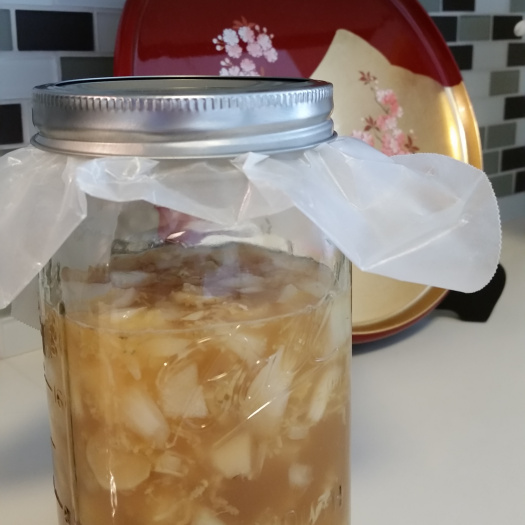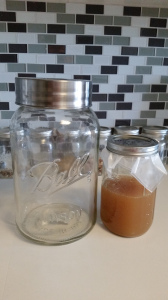 ©2017 Loretta McClellan; all rights reserved. First-ever homemade batch of a “Fire Cider”-like product for family wellness support. May it bask in the simplicity of its existence, unaware of the infamy of its commercialized or marginalized cousins.
©2017 Loretta McClellan; all rights reserved. First-ever homemade batch of a “Fire Cider”-like product for family wellness support. May it bask in the simplicity of its existence, unaware of the infamy of its commercialized or marginalized cousins.
“As a side note, stumbling upon a genuine retail bottle of Fire Cider® from Shire City Herbals recently in a rural, Downeast Maine hardware and sundries store, was, in a way, like coming face to face with a fabled, mythical beast—a real, live, elephant in the room.”
IN MASTERING THE ART OF WAITING, which is not a game, but a rather remarkable and introspective part of the Herbalism process, we learn by doing and multitasking. We succeed by remembering that, just as it takes time for a plant to grow from a seed and yield its goodness as plant medicine, just as it takes time for a bee to do its equally miraculous industry regionally in the pollination process, making herbal products to promote self-healing is a mindful and reflective practice, one that should not, and often cannot, be rushed.
With winter approaching and cold season looming, “Fire Cider,” the beautiful herbal vinegar and recipe that Rosemary Gladstar prominently taught and made famous decades ago and forever since, moved to the top of the must-make-first list for the homemade family apothecary. Making this product, considered a tonic by some, was a lesson in partnering intuition with purpose and productivity.
Following Rosemary’s recipe on page 74 of her book, Medicinal Herbs: A Beginner’s Guide, a fork in the road appeared, offering an Eastern route, heading to Japan for herbal inspiration. Instead of three tablespoons horseradish, as called for in the recipe, one tablespoon of fresh wasabi (Wasabia japonica or Eutrema japonica) was substituted (fresh from the stem, not paste or powder; beware, real wasabi is much more expensive than horseradish, and packs a powerful punch). Additionally, burdock root (Arctium lappa), known as gobo in Japan, was included. It just felt right. As it turned out, it was an ideal complement to the other Japanese ingredient of wasabi, along with the magnificence of fresh garlic, ginger, onions and warmed organic apple cider vinegar—the original ingredients. The signature addition of gobo’s brilliance in cooling, grounding, and as an immune system strengthener also provided an anticipated balance for the mix for those family members with dry constitutions.
From start to finish, the homemade process took three weeks. The aroma from the ingredients was instantly mouth-watering; it was difficult to say farewell for a time. They were placed in a quart jar and enjoyed a sunny staycation on a windowsill for 21 days.
When the time came, it was as if the stars aligned and the angels rejoiced, especially when the sampling began. To the two-cup yield after straining the herbs, two tablespoons of honey were added for taste; however, no cayenne was added to this batch, despite the recipe calling for it. The powerful energetics of this wisdom in a jar were undeniable.
As a side note, stumbling upon a genuine retail bottle of Fire Cider® from Shire City Herbals recently in a rural, Downeast Maine hardware and sundries store, was, in a way, like coming face to face with a fabled, mythical beast—a real, live, elephant in the room. The proprietor was asked if he knew about the media and legal issues surrounding the single little bottle, displayed all by its lonesome on the shelf. He said that he knew. Then silence. And that was the end of that subject.
Being a branding professional, having designed numerous logos and corporate identity over the years, trademarked design is as common as breathing; however, just as Band-aid® is a registered trademark and common identifier for an adhesive bandage, it is part of the lexicon of American English. Got a cut? Go grab a Band-aid/bandaid! An item of note is that Johnson & Johnson trademarked the name of basically a new invention, in adhesive strips. While only herbalists know what “Fire Cider,” the homemade herbal vinegar, is, it too is part of a lexicon, an international and historic one, in that the tonic and its variant recipes have been used for decades, perhaps centuries in some form, improved upon, and has become mainstream with its benefits duly promoted, by a beloved Herbal Sensei named Rosemary Gladstar. This healthful, liquid herbal goodness is as synonymous with Rosemary Gladstar and integral to the herbal community as first aid is with the Red Cross—and the Red Cross is grateful for the invention of adhesive bandages (and Herbalists consider “Fire Cider” a reputable remedy for first aid, a first responder for colds!).
In branding and marketing a product line, you’re either first or best, preferably both. Brands are protected, as generally, much thought and ownership goes into the design and concept; for those who don’t know a brilliant, yet affordable design expert, the process can be costly. Trademarking a legacy, a piece of shared history in an herbal remedy, seems preposterous to some, but in reality, it can and has been done (view the Fire Cider® trademark records by a query in the registry at USPTO.gov, including Fire Cider Sauerkraut®). Honoring the trademark ownership, no matter how incongruent it is with the general consensus, is bought and paid for. A clerk, somewhere deep in the recesses of the U.S. Patent and Trademark Office approved the registration.
To receive a request to cease and desist the manufacturing and sale of a “fire cider”-like product of a competitor of Shire City Herbals, using their now-trademarked name is warranted in the eyes of U.S. trademark law; however, use of the common moniker of “Fire Cider” by those making their own homemade product, not for sale, but using the name in print or attributing the name with its legacy holder in Rosemary Gladstar should receive a gracious ignore by the trademark owner.
The light at the end of the fire-y tunnel is that registered trademarks need to be regularly renewed with USPTO.gov, which cost money. Moreover, the trademark owner may choose of their own volition to not renew, perhaps selecting another name to herald their new and improved recipe (Shire Fire™, perhaps? Contact the author for terms and ownership transfer, as well as professional re-branding, should you so desire.), so that the masses can enjoy what is indelibly part of their culture and shared history, celebrating it more fully. Everyone wins.
 ©2017 Loretta McClellan; all rights reserved. The elusive gallon size mason jar next to a quart of CiderCare™, waiting to be filled with the next batch.
©2017 Loretta McClellan; all rights reserved. The elusive gallon size mason jar next to a quart of CiderCare™, waiting to be filled with the next batch.
There are so many product and business names to choose from, even names that are made up, that become not just lexicon, but verbs (Google, anyone?). That’s the fun of branding. Invention. Innovation. Inspiration. Creation. Why call your cutting-edge product a common, household, home remedy name? The reasons may never be known. In the meantime, this author is celebrating, in being part of a shared community and treasured history of herbal goodness for everyone is right in our cupboards, manifested most tangibly in her not-for-sale and not-at-all-famous, CiderCare™ (you read it here first!). Next time, gallon size, to share!
Author’s Note: Just a shout-out to the herbal goodness and prompt support of “Fire Cider.” Started getting what would have been a wicked cold. Enjoyed some of my first batch of CiderCare™ and BAM! Next morning, I’m a new woman.
Disclaimer: The author is not an attorney, medical professional, nutritionist or dietician. Content on this website is for informational purposes only. It is not intended to substitute for legal advice, medical treatment or diagnosis and is not monitored or evaluated by the Food and Drug Administration/FDA. Consult your health care provider if you are experiencing any symptoms and before using any herbal product. Whenever wildcrafting or foraging in the wild for herbs, be accompanied by an expert and always confirm plant identity with absolute certainty before using or consuming them. Any application of the material provided is at the reader’s discretion and is his or her sole responsibility.
____________________________________________
 The heart of Botaniscape™ and budding Herbalist/Wildcrafter, Lori McClellan sees the Art of Herbalism as her lifelong connection to Nature and wonder manifested most fully—another exciting medium and source of abundant joy. A daily meditator and career Journalist, Author, Artist and Poet, she creates as Loretta Boyer McClellan. Her works as a publisher and writer of fiction, nonfiction and poetry; conscious PR, brand, graphic design, and communications; and as an Arts instructor, journalist and artist, “sized the canvas,” so to speak, for a fruitful life of expression, connection and inspiration. Author of The Nature of BEing: A Healing Journey, The Misthaven of Maine Series, and Dodging Raindrops: Poems and Prose of Beauty, Peace and Healing, Lori creates from a place of Oneness. Writing, meditating, painting, and her relationship with Nature and all beings, most tangibly through Herbalism, are her connection to the Infinite.
The heart of Botaniscape™ and budding Herbalist/Wildcrafter, Lori McClellan sees the Art of Herbalism as her lifelong connection to Nature and wonder manifested most fully—another exciting medium and source of abundant joy. A daily meditator and career Journalist, Author, Artist and Poet, she creates as Loretta Boyer McClellan. Her works as a publisher and writer of fiction, nonfiction and poetry; conscious PR, brand, graphic design, and communications; and as an Arts instructor, journalist and artist, “sized the canvas,” so to speak, for a fruitful life of expression, connection and inspiration. Author of The Nature of BEing: A Healing Journey, The Misthaven of Maine Series, and Dodging Raindrops: Poems and Prose of Beauty, Peace and Healing, Lori creates from a place of Oneness. Writing, meditating, painting, and her relationship with Nature and all beings, most tangibly through Herbalism, are her connection to the Infinite.





